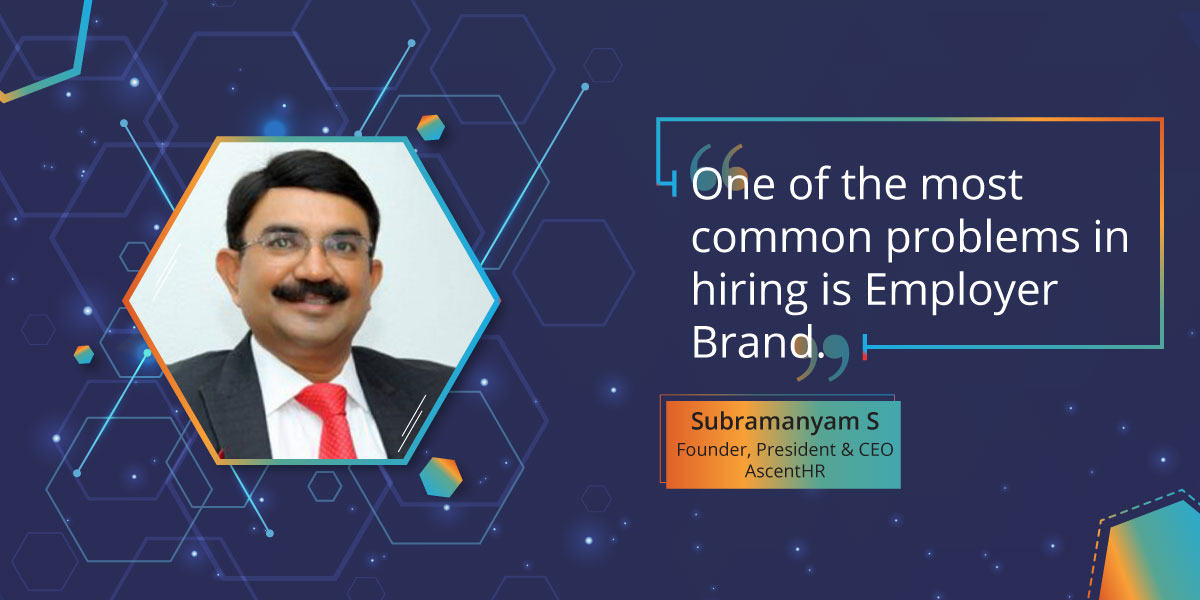
Conversation with Subramanyam S, Founder, President, and CEO, AscentHR
Subramanyam Sreenivasaiah – Founder, President and CEO of AscentHR, is an entrepreneur with immense experience in Finance, Legal and Business Management. He is a corporate lawyer and a fellow member of “The Institute of Company Secretaries of India”. A finance and business management specialist, it was Subramanyam’s quest to introduce innovative solutions and services in the HR industry that led him to build AscentHR.
His experience includes exposures in Advani Oerlikon group, Shonk Technologies in Finance, HR and Corporate Legal Services.
Talent spotters now regard potential as one of the key employee attributes for hiring. How do you spot potential and passion during a job interview?
An effective hiring strategy needs to be focussed on a set of attributes required for a particular job or role. It is usually peculiar or unique to the industry for which hiring is on.
While in a difficult labor market, potential may be an inevitable driver, it is an uncertain and not accurately measurable feature for any industry whatsoever. The decision is purely based on the gut call of the hirer. Therefore, it has extra stress on the hiring system in finding the right person for the selection process.
Q: What are some of the other essential attributes you look for in a job applicant?
Here again, the challenges can vary for different employers based on their industries or sizes. One of the most common problems in hiring is Employer
Brand. With overactive social media and information available on the internet, reputation management is a crucial driver for hiring for any employer.
Also, an inadequate sourcing strategy can be as low as the inability to attract the right candidate to a higher challenge of sourcing beyond the usual methods or reach. Engaging a candidate and making sure his experience is good while hiring can make even a passive hiring source active and enlarge the net. Transparency in the process and quick response system in the IVR era can help candidates reach out without hesitation.
Q: How crucial is a candidate’s domain knowledge regarding hiring, and what is your experience on this front from campuses?
For a lateral hire, subject matter expertise is a must. However, for a fresher, the domain knowledge is limited to the course study she/he has undertaken. Application of the principles is low except in the software industry where general skills are easy to acquire and useful in just-in-time hiring. Other sectors are usually unique in their practices. On-the-job training is inevitable for all other industries for freshers. The average time to fully onboard candidates and make them productive can vary from six months to a year, depending on their role complexity or the industry practice.
Q: What is the transitional change which a candidate has to be prepared for when she/he enters the job market from the campus?
We must have a paradigm shift in imparting job skills instead of the formal education that we do have today as a practice. Companies do not recognize degrees as skills. However, they are keen on specific expertise in candidates that make them continually productive at work. Besides, dynamics such as changing
life patterns, understanding work ethics and work culture, and absorbing new value systems make it overwhelming for freshers to learn, adapt, and adopt. Have an open mind. Don’t be notional about anything.
Q: How can candidates make themselves valuable in their line of work? How severe can be the cost of making mistakes at the start of their careers, where it can end with a little red circle?
Choosing the right career in which one is passionate addresses most of the issues for a fresher. Passion drives careers. Compromising on the time invested or hardships undertaken contribute constructively on making a positive difference to one’s learning curve. The converse is true as well. Taking up a job merely for an employment opportunity will have its bearing on one’s professional career, leading to uncertainties, disinterest, frequent job-hops, and a repelling resume. A career mistake can undoubtedly affect anyone severely, and any error is not easily condoned as it used to be in a collegiate system making life harder for the person leading to disillusionment.
Key Takeaways:
- How cultivating a great company culture is crucial
- Identify leaders who can strive for company’s growth
- How domain knowledge expertise is crucial for when hiring





